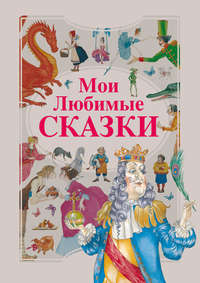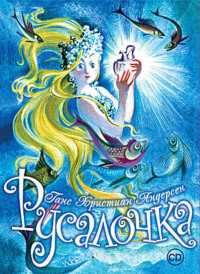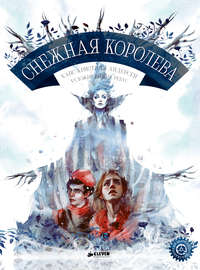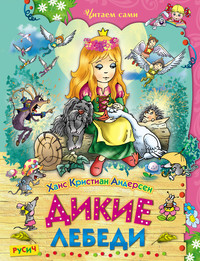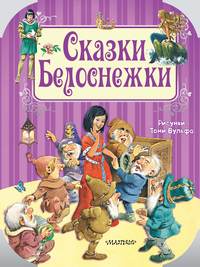 полная версия
полная версияHans Andersen's Fairy Tales. First Series
Then she took Gerda into the flower garden. How fragrant and beautiful it was! Every flower that could be thought of, for every season of the year, was here in full bloom; no picture book could have more beautiful colors. Gerda jumped for joy, and played till the sun went down behind the tall cherry trees; then she slept in an elegant bed, with red silk pillows embroidered with colored violets, and she dreamed as pleasantly as a queen on her wedding day.
The next day, and for many days after, Gerda played with the flowers in the warm sunshine. She knew every flower, and yet, although there were so many of them, it seemed as if one were missing, but what it was she could not tell. One day, however, as she sat looking at the old woman's hat with the painted flowers on it, she saw that the prettiest of them all was a rose. The old woman had forgotten to take it from her hat when she made all the roses sink into the earth. But it is difficult to keep the thoughts together in everything, and one little mistake upsets all our arrangements.
"What! are there no roses here?" cried Gerda, and she ran out into the garden and examined all the beds, and searched and searched. There was not one to be found. Then she sat down and wept, and her tears fell just on the place where one of the rose trees had sunk down. The warm tears moistened the earth, and the rose tree sprouted up at once, as blooming as when it had sunk; and Gerda embraced it, and kissed the roses, and thought of the beautiful roses at home, and, with them, of little Kay.
"Oh, how I have been detained!" said the little maiden. "I wanted to seek for little Kay. Do you know where he is?" she asked the roses; "do you think he is dead?"
And the roses answered: "No, he is not dead. We have been in the ground, where all the dead lie, but Kay is not there."
"Thank you," said little Gerda, and then she went to the other flowers and looked into their little cups and asked, "Do you know where little Kay is?" But each flower as it stood in the sunshine dreamed only of its own little fairy tale or history. Not one knew anything of Kay. Gerda heard many stories from the flowers, as she asked them one after another about him.
And then she ran to the other end of the garden. The door was fastened, but she pressed against the rusty latch, and it gave way. The door sprang open, and little Gerda ran out with bare feet into the wide world. She looked back three times, but no one seemed to be following her. At last she could run no longer, so she sat down to rest on a great stone, and when she looked around she saw that the summer was over and autumn very far advanced. She had known nothing of this in the beautiful garden where the sun shone and the flowers grew all the year round.
"Oh, how I have wasted my time!" said little Gerda. "It is autumn; I must not rest any longer," and she rose to go on. But her little feet were wounded and sore, and everything around her looked cold and bleak. The long willow leaves were quite yellow, the dewdrops fell like water, leaf after leaf dropped from the trees; the sloe thorn alone still bore fruit, but the sloes were sour and set the teeth on edge. Oh, how dark and weary the whole world appeared!
FOURTH STORYTHE PRINCE AND PRINCESSGerda was obliged to rest again, and just opposite the place where she sat she saw a great crow come hopping toward her across the snow. He stood looking at her for some time, and then he wagged his head and said, "Caw, caw, good day, good day." He pronounced the words as plainly as he could, because he meant to be kind to the little girl, and then he asked her where she was going all alone in the wide world.
The word "alone" Gerda understood very well and felt how much it expressed. So she told the crow the whole story of her life and adventures and asked him if he had seen little Kay.
The crow nodded his head very gravely and said, "Perhaps I have – it may be."
"No! Do you really think you have?" cried little Gerda, and she kissed the crow and hugged him almost to death, with joy.
"Gently, gently," said the crow. "I believe I know. I think it may be little Kay; but he has certainly forgotten you by this time, for the princess."
"Does he live with a princess?" asked Gerda.
"Yes, listen," replied the crow; "but it is so difficult to speak your language. If you understand the crows' language, then I can explain it better. Do you?"
"No, I have never learned it," said Gerda, "but my grandmother understands it, and used to speak it to me. I wish I had learned it."
"It does not matter," answered the crow. "I will explain as well as I can, although it will be very badly done"; and he told her what he had heard.
"In this kingdom where we now are," said he, "there lives a princess who is so wonderfully clever that she has read all the newspapers in the world – and forgotten them too, although she is so clever.
"A short time ago, as she was sitting on her throne, which people say is not such an agreeable seat as is often supposed, she began to sing a song which commences with these words:
Why should I not be married?'Why not, indeed?' said she, and so she determined to marry if she could find a husband who knew what to say when he was spoken to, and not one who could only look grand, for that was so tiresome. She assembled all her court ladies at the beat of the drum, and when they heard of her intentions they were very much pleased.
"'We are so glad to hear of it,' said they. 'We were talking about it ourselves the other day.'
"You may believe that every word I tell you is true," said the crow, "for I have a tame sweetheart who hops freely about the palace, and she told me all this."
Of course his sweetheart was a crow, for "birds of a feather flock together," and one crow always chooses another crow.
"Newspapers were published immediately with a border of hearts and the initials of the princess among them. They gave notice that every young man who was handsome was free to visit the castle and speak with the princess, and those who could reply loud enough to be heard when spoken to were to make themselves quite at home at the palace, and the one who spoke best would be chosen as a husband for the princess.
"Yes, yes, you may believe me. It is all as true as I sit here," said the crow.
"The people came in crowds. There was a great deal of crushing and running about, but no one succeeded either on the first or the second day. They could all speak very well while they were outside in the streets, but when they entered the palace gates and saw the guards in silver uniforms and the footmen in their golden livery on the staircase and the great halls lighted up, they became quite confused. And when they stood before the throne on which the princess sat they could do nothing but repeat the last words she had said, and she had no particular wish to hear her own words over again. It was just as if they had all taken something to make them sleepy while they were in the palace, for they did not recover themselves nor speak till they got back again into the street. There was a long procession of them, reaching from the town gate to the palace.
"I went myself to see them," said the crow. "They were hungry and thirsty, for at the palace they did not even get a glass of water. Some of the wisest had taken a few slices of bread and butter with them, but they did not share it with their neighbors; they thought if the others went in to the princess looking hungry, there would be a better chance for themselves."
"But Kay! tell me about little Kay!" said Gerda. "Was he among the crowd?"
"Stop a bit; we are just coming to him. It was on the third day that there came marching cheerfully along to the palace a little personage without horses or carriage, his eyes sparkling like yours. He had beautiful long hair, but his clothes were very poor."
"That was Kay," said Gerda, joyfully. "Oh, then I have found him!" and she clapped her hands.
"He had a little knapsack on his back," added the crow.
"No, it must have been his sledge," said Gerda, "for he went away with it."
"It may have been so," said the crow; "I did not look at it very closely. But I know from my tame sweetheart that he passed through the palace gates, saw the guards in their silver uniform and the servants in their liveries of gold on the stairs, but was not in the least embarrassed.
"'It must be very tiresome to stand on the stairs,' he said. 'I prefer to go in.'
"The rooms were blazing with light; councilors and ambassadors walked about with bare feet, carrying golden vessels; it was enough to make any one feel serious. His boots creaked loudly as he walked, and yet he was not at all uneasy."
"It must be Kay," said Gerda; "I know he had new boots on. I heard them creak in grandmother's room."
"They really did creak," said the crow, "yet he went boldly up to the princess herself, who was sitting on a pearl as large as a spinning wheel. And all the ladies of the court were present with their maids and all the cavaliers with their servants, and each of the maids had another maid to wait upon her, and the cavaliers' servants had their own servants as well as each a page. They all stood in circles round the princess, and the nearer they stood to the door the prouder they looked. The servants' pages, who always wore slippers, could hardly be looked at, they held themselves up so proudly by the door."
"It must be quite awful," said little Gerda; "but did Kay win the princess?"
"If I had not been a crow," said he, "I would have married her myself, although I am engaged. He spoke as well as I do when I speak the crows' language. I heard this from my tame sweetheart. He was quite free and agreeable and said he had not come to woo the princess, but to hear her wisdom. And he was as pleased with her as she was with him."
"Oh, certainly that was Kay," said Gerda; "he was so clever; he could work mental arithmetic and fractions. Oh, will you take me to the palace?"
"It is very easy to ask that," replied the crow, "but how are we to manage it? However, I will speak about it to my tame sweetheart and ask her advice, for, I must tell you, it will be very difficult to gain permission for a little girl like you to enter the palace."
"Oh, yes, but I shall gain permission easily," said Gerda, "for when Kay hears that I am here he will come out and fetch me in immediately."
"Wait for me here by the palings," said the crow, wagging his head as he flew away.
It was late in the evening before the crow returned. "Caw, caw!" he said; "she sends you greeting, and here is a little roll which she took from the kitchen for you. There is plenty of bread there, and she thinks you must be hungry. It is not possible for you to enter the palace by the front entrance. The guards in silver uniform and the servants in gold livery would not allow it. But do not cry; we will manage to get you in. My sweetheart knows a little back staircase that leads to the sleeping apartments, and she knows where to find the key."
Then they went into the garden, through the great avenue, where the leaves were falling one after another, and they could see the lights in the palace being put out in the same manner. And the crow led little Gerda to a back door which stood ajar. Oh! how her heart beat with anxiety and longing; it was as if she were going to do something wrong, and yet she only wanted to know where little Kay was.
"It must be he," she thought, "with those clear eyes and that long hair."
She could fancy she saw him smiling at her as he used to at home when they sat among the roses. He would certainly be glad to see her, and to hear what a long distance she had come for his sake, and to know how sorry they had all been at home because he did not come back. Oh, what joy and yet what fear she felt!
They were now on the stairs, and in a small closet at the top a lamp was burning. In the middle of the floor stood the tame crow, turning her head from side to side and gazing at Gerda, who curtsied as her grandmother had taught her to do.
"My betrothed has spoken so very highly of you, my little lady," said the tame crow. "Your story is very touching. If you will take the lamp, I will walk before you. We will go straight along this way; then we shall meet no one."
"I feel as if somebody were behind us," said Gerda, as something rushed by her like a shadow on the wall; and then it seemed to her that horses with flying manes and thin legs, hunters, ladies and gentlemen on horseback, glided by her like shadows.
"They are only dreams," said the crow; "they are coming to carry the thoughts of the great people out hunting. All the better, for if their thoughts are out hunting, we shall be able to look at them in their beds more safely. I hope that when you rise to honor and favor you will show a grateful heart."
"You may be quite sure of that," said the crow from the forest.
They now came into the first hall, the walls of which were hung with rose-colored satin embroidered with artificial flowers. Here the dreams again flitted by them, but so quickly that Gerda could not distinguish the royal persons. Each hall appeared more splendid than the last. It was enough to bewilder one. At length they reached a bedroom. The ceiling was like a great palm tree, with glass leaves of the most costly crystal, and over the center of the floor two beds, each resembling a lily, hung from a stem of gold. One, in which the princess lay, was white; the other was red. And in this Gerda had to seek for little Kay.
She pushed one of the red leaves aside and saw a little brown neck. Oh, that must be Kay! She called his name loudly and held the lamp over him. The dreams rushed back into the room on horseback. He woke and turned his head round – it was not little Kay! The prince was only like him; still he was young and pretty. Out of her white-lily bed peeped the princess, and asked what was the matter. Little Gerda wept and told her story, and all that the crows had done to help her.
"You poor child," said the prince and princess; then they praised the crows, and said they were not angry with them for what they had done, but that it must not happen again, and that this time they should be rewarded.
"Would you like to have your freedom?" asked the princess, "or would you prefer to be raised to the position of court crows, with all that is left in the kitchen for yourselves?"
Then both the crows bowed and begged to have a fixed appointment; for they thought of their old age, and it would be so comfortable, they said, to feel that they had made provision for it.
And then the prince got out of his bed and gave it up to Gerda – he could not do more – and she lay down. She folded her little hands and thought, "How good everybody is to me, both men and animals"; then she closed her eyes and fell into a sweet sleep. All the dreams came flying back again to her, looking like angels now, and one of them drew a little sledge, on which sat Kay, who nodded to her. But all this was only a dream. It vanished as soon as she awoke.
The following day she was dressed from head to foot in silk and velvet and invited to stay at the palace for a few days and enjoy herself; but she only begged for a pair of boots and a little carriage and a horse to draw it, so that she might go out into the wide world to seek for Kay.
And she obtained not only boots but a muff, and was neatly dressed; and when she was ready to go, there at the door she found a coach made of pure gold with the coat of arms of the prince and princess shining upon it like a star, and the coachman, footman, and outriders all wearing golden crowns upon their heads. The prince and princess themselves helped her into the coach and wished her success.
The forest crow, who was now married, accompanied her for the first three miles; he sat by Gerda's side, as he could not bear riding backwards. The tame crow stood in the doorway flapping her wings. She could not go with them, because she had been suffering from headache ever since the new appointment, no doubt from overeating. The coach was well stored with sweet cakes, and under the seat were fruit and gingerbread nuts.
"Farewell, farewell," cried the prince and princess, and little Gerda wept, and the crow wept; and then, after a few miles, the crow also said farewell, and this parting was even more sad. However he flew to a tree and stood flapping his black wings as long as he could see the coach, which glittered like a sunbeam.
FIFTH STORYTHE LITTLE ROBBER GIRLThe coach drove on through a thick forest, where it lighted up the way like a torch and dazzled the eyes of some robbers, who could not bear to let it pass them unmolested.
"It is gold! it is gold!" cried they, rushing forward and seizing the horses. Then they struck dead the little jockeys, the coachman, and the footman, and pulled little Gerda out of the carriage.
"She is plump and pretty. She has been fed with the kernels of nuts," said the old robber woman, who had a long beard, and eyebrows that hung over her eyes. "She is as good as a fatted lamb; how nice she will taste!" and as she said this she drew forth a shining knife, that glittered horribly. "Oh!" screamed the old woman at the same moment, for her own daughter, who held her back, had bitten her in the ear. "You naughty girl," said the mother, and now she had not time to kill Gerda.
"She shall play with me," said the little robber girl. "She shall give me her muff and her pretty dress, and sleep with me in my bed." And then she bit her mother again, and all the robbers laughed.
"I will have a ride in the coach," said the little robber girl, and she would have her own way, for she was self-willed and obstinate.
She and Gerda seated themselves in the coach and drove away over stumps and stones, into the depths of the forest. The little robber girl was about the same size as Gerda, but stronger; she had broader shoulders and a darker skin; her eyes were quite black, and she had a mournful look. She clasped little Gerda round the waist and said:
"They shall not kill you as long as you don't make me vexed with you. I suppose you are a princess."
"No," said Gerda; and then she told her all her history and how fond she was of little Kay.
The robber girl looked earnestly at her, nodded her head slightly, and said, "They shan't kill you even if I do get angry with you, for I will do it myself." And then she wiped Gerda's eyes and put her own hands into the beautiful muff, which was so soft and warm.
The coach stopped in the courtyard of a robber's castle, the walls of which were full of cracks from top to bottom. Ravens and crows flew in and out of the holes and crevices, while great bulldogs, each of which looked as if it could swallow a man, were jumping about; but they were not allowed to bark.
In the large old smoky hall a bright fire was burning on the stone floor. There was no chimney, so the smoke went up to the ceiling and found a way out for itself. Soup was boiling in a large cauldron, and hares and rabbits were roasting on the spit.
"You shall sleep with me and all my little animals to-night," said the robber girl after they had had something to eat and drink. So she took Gerda to a corner of the hall where some straw and carpets were laid down. Above them, on laths and perches, were more than a hundred pigeons that all seemed to be asleep, although they moved slightly when the two little girls came near them. "These all belong to me," said the robber girl, and she seized the nearest to her, held it by the feet, and shook it till it flapped its wings. "Kiss it," cried she, flapping it in Gerda's face.
"There sit the wood pigeons," continued she, pointing to a number of laths and a cage which had been fixed into the walls, near one of the openings. "Both rascals would fly away directly, if they were not closely locked up. And here is my old sweetheart 'Ba,'" and she dragged out a reindeer by the horn; he wore a bright copper ring round his neck and was tethered to the spot. "We are obliged to hold him tight too, else he would run away from us also. I tickle his neck every evening with my sharp knife, which frightens him very much." And the robber girl drew a long knife from a chink in the wall and let it slide gently over the reindeer's neck. The poor animal began to kick, and the little robber girl laughed and pulled down Gerda into bed with her.
"Will you have that knife with you while you are asleep?" asked Gerda, looking at it in great fright.
"I always sleep with the knife by me," said the robber girl. "No one knows what may happen. But now tell me again all about little Kay, and why you went out into the world."
Then Gerda repeated her story over again, while the wood pigeons in the cage over her cooed, and the other pigeons slept. The little robber girl put one arm across Gerda's neck, and held the knife in the other, and was soon fast asleep and snoring. But Gerda could not close her eyes at all; she knew not whether she was to live or to die. The robbers sat round the fire, singing and drinking. It was a terrible sight for a little girl to witness.
Then the wood pigeons said: "Coo, coo, we have seen little Kay. A white fowl carried his sledge, and he sat in the carriage of the Snow Queen, which drove through the wood while we were lying in our nest. She blew upon us, and all the young ones died, excepting us two. Coo, coo."
"What are you saying up there?" cried Gerda. "Where was the Snow Queen going? Do you know anything about it?"
"She was most likely traveling to Lapland, where there is always snow and ice. Ask the reindeer that is fastened up there with a rope."
"Yes, there is always snow and ice," said the reindeer, "and it is a glorious place; you can leap and run about freely on the sparkling icy plains. The Snow Queen has her summer tent there, but her strong castle is at the North Pole, on an island called Spitzbergen."
"O Kay, little Kay!" sighed Gerda.
"Lie still," said the robber girl, "or you shall feel my knife."
In the morning Gerda told her all that the wood pigeons had said, and the little robber girl looked quite serious, and nodded her head and said: "That is all talk, that is all talk. Do you know where Lapland is?" she asked the reindeer.
"Who should know better than I do?" said the animal, while his eyes sparkled. "I was born and brought up there and used to run about the snow-covered plains."
"Now listen," said the robber girl; "all our men are gone away; only mother is here, and here she will stay; but at noon she always drinks out of a great bottle, and afterwards sleeps for a little while; and then I'll do something for you." She jumped out of bed, clasped her mother round the neck, and pulled her by the beard, crying, "My own little nanny goat, good morning!" And her mother pinched her nose till it was quite red; yet she did it all for love.
When the mother had gone to sleep the little robber maiden went to the reindeer and said: "I should like very much to tickle your neck a few times more with my knife, for it makes you look so funny, but never mind – I will untie your cord and set you free, so that you may run away to Lapland; but you must make good use of your legs and carry this little maiden to the castle of the Snow Queen, where her playfellow is. You have heard what she told me, for she spoke loud enough, and you were listening."
The reindeer jumped for joy, and the little robber girl lifted Gerda on his back and had the forethought to tie her on and even to give her her own little cushion to sit upon.
"Here are your fur boots for you," said she, "for it will be very cold; but I must keep the muff, it is so pretty. However, you shall not be frozen for the want of it; here are my mother's large warm mittens; they will reach up to your elbows. Let me put them on. There, now your hands look just like my mother's."
But Gerda wept for joy.
"I don't like to see you fret," said the little robber girl. "You ought to look quite happy now. And here are two loaves and a ham, so that you need not starve."
These were fastened upon the reindeer, and then the little robber maiden opened the door, coaxed in all the great dogs, cut the string with which the reindeer was fastened, with her sharp knife, and said, "Now run, but mind you take good care of the little girl." And Gerda stretched out her hand, with the great mitten on it, toward the little robber girl and said "Farewell," and away flew the reindeer over stumps and stones, through the great forest, over marshes and plains, as quickly as he could. The wolves howled and the ravens screamed, while up in the sky quivered red lights like flames of fire. "There are my old northern lights," said the reindeer; "see how they flash!" And he ran on day and night still faster and faster, but the loaves and the ham were all eaten by the time they reached Lapland.


